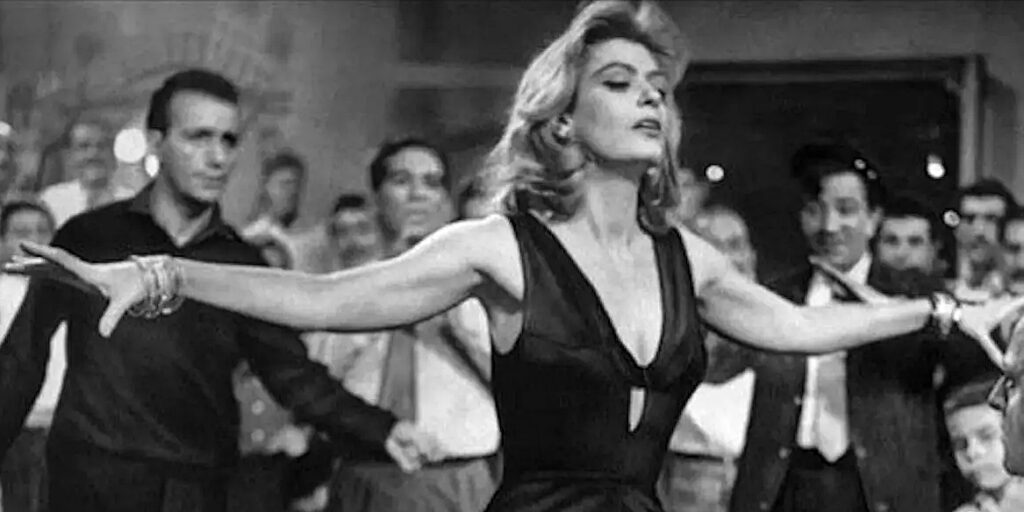Foreign language films trying to get Oscar nominations might as well be a 2023 Raye song, considering how much it’s “Hard Out Here.” Such motion pictures frequently struggle to break into Oscar categories beyond the Best International Feature domain. For proof of this, look no further than the acting categories. It took until the 33rd Oscars for a performer (Melina Mercouri in Best Actress for “Never on Sunday”) to score an acting nod for a non-English language performance in a foreign film. Think about all the enthralling and legendary turns ignored by the Academy across its first 32 ceremonies. It even took until the 39th Academy Awards for a foreign language film to crack the Best Cinematography category. Meanwhile, only two foreign language films were recognized in the Best Editing category across the first 70 Academy Award ceremonies.
The Academy’s Western-centric nature is no secret. This phenomenon has tragically left many acclaimed motion pictures on the outside looking in. However, a few Oscar categories have been significantly more hospitable to foreign-language titles. One of the most notable categories is also one of the most high-profile Oscar categories: Best Director. This domain is often considered a handy precursor to potential Best Picture winners. It’s also a place where filmmakers from around the globe can get recognition that eluded them in other Oscar categories.
In 1961, Jules Dassin cracked the seal on foreign-language filmmakers entering the Best Director Oscar category. Dassin was being recognized for “Never on Sunday” (which also scored a landmark Best Actress nomination), and a 1960s near-annual trend of one foreign Best Director nomination followed. Eight of the ten ceremonies in this decade found room for directors whose works weren’t told in English. This included four consecutive ceremonies at the start of the decade. Foreign language filmmakers had gone from being MIA in the Best Director Oscar race to becoming a fixture.
 The abrupt ubiquity of foreign language filmmakers in this category is no coincidence. The 1960s was a golden age for world cinema. Filmmakers like Federico Fellini, Agnes Varda, Michelangelo Antonioni, and countless others created features that challenged what movies could be. Meanwhile, the first half of the 1960s saw American cinema largely churning out bubbly musicals and broad family comedies. Such titles were out of step with the revolutionary mood of the country. This dissonance between mainstream American movies and domestic events, like the Civil Rights Movement, made the gritty reality of acclaimed foreign films all the more relevant to American moviegoers. This relevancy gave titles like “8 1/2” and “The Battle of Algiers” enough of a reputation to bowl over Oscar voters.
The abrupt ubiquity of foreign language filmmakers in this category is no coincidence. The 1960s was a golden age for world cinema. Filmmakers like Federico Fellini, Agnes Varda, Michelangelo Antonioni, and countless others created features that challenged what movies could be. Meanwhile, the first half of the 1960s saw American cinema largely churning out bubbly musicals and broad family comedies. Such titles were out of step with the revolutionary mood of the country. This dissonance between mainstream American movies and domestic events, like the Civil Rights Movement, made the gritty reality of acclaimed foreign films all the more relevant to American moviegoers. This relevancy gave titles like “8 1/2” and “The Battle of Algiers” enough of a reputation to bowl over Oscar voters.
In the 1970s, foreign language filmmakers became more prominent in the Best Director category. However, there was a caveat: Only seven ceremonies from this decade found room to nominate these filmmakers compared to the eight ceremonies of the 1960s. Still, one of those ceremonies (the 49th Academy Awards in 1977) found room to nominate two foreign language films for Best Director: Ingmar Bergman for “Face to Face” and Lina Wertmüller for “Seven Beauties.” Multiple foreign film nominees could exist simultaneously in the Best Director category. This occurred while the Best Picture category lagged far behind Best Director in representing global cinema. The Best Picture Oscar domain only nominated four foreign-language films across the show’s first 67 ceremonies. The Best Director matched half of that figure from just one 1970s ceremony.
That lack of foreign language Best Picture winners did suggest one strange Oscar trend: Foreign language films often got dubbed (intentionally or not) as only good enough for the Best Director category, but not Best Picture. Now, this trend of foreign films getting Best Director nods but not Best Picture initially had more innocent roots. Today, it’s rare for Best Director nominees to miss out on a Best Picture nomination. Before 1980, though, the Best Director category often looked wildly different than Best Picture. Take the 39th Academy Award nominees for Best Director, for example. That roster included Claude Lelouch getting nominated for “A Man and a Woman.” Lelouch’s French feature didn’t get a Best Picture nomination, nor did two English-language Best Director nominees that year. Two years later, the foreign-language Best Director nominee, “The Battle of Algiers,” would get snubbed from Best Picture. Another Best Director-nominated motion picture from that year that also failed to get into Best Picture? A little movie called “2001: A Space Odyssey.”
This discrepancy can likely be explained by the difference in who can vote for Best Director and Best Picture nominees. Only the directing branch can vote on Best Director nominees. This group of individuals is much more conscious of the global sphere of filmmakers compared to the broader array of artists voting on Best Picture. Folks who make a living navigating the global filmmaking landscape inevitably are more conscious of Fellini and Wertmüller. This would also explain why more mainstream-friendly titles like “Doctor Dolittle” and “Bohemian Rhapsody” beat out foreign-language Best Director nominees for Best Picture slots.
Even with such innocent forces at work, this phenomenon has become extra troublesome in recent years. Foreign language Best Director nominees missing out on Best Picture slots once looked like the luck of the draw. This recurring exclusion is more irksome now since the Best Director and Best Picture nominations have grown more closely aligned. Plus, the expansion of the Best Picture category past five nominations back in 2010 has highlighted this weird phenomenon. Two of the only three post-2009 Best Director nominees not to simultaneously score Best Picture nominations are foreign-language titles (“Foxcatcher” being the one English-language anomaly). Titles like “Bohemian Rhapsody” scoring Best Picture slots over “Cold War” and “Another Round” make this trend downright infuriating.
 Then again, it’s not like the Best Director category at the Oscars has been a total utopia for foreign-language filmmakers. In the 1980s, overseas directors struggled to garner nominations for Best Director. There were only four foreign-language Best Director nominees across the decade. Once the 1990s rolled around, that number further declined to just three foreign Best Director nominees. Thankfully, the 2000s saw a slight return for foreign-language films in Best Director. That resurgence included two films primarily not in English getting Best Director nods at the 79th Oscars (though both were produced by American studios): “Letters from Iwo Jima” and “Babel.”
Then again, it’s not like the Best Director category at the Oscars has been a total utopia for foreign-language filmmakers. In the 1980s, overseas directors struggled to garner nominations for Best Director. There were only four foreign-language Best Director nominees across the decade. Once the 1990s rolled around, that number further declined to just three foreign Best Director nominees. Thankfully, the 2000s saw a slight return for foreign-language films in Best Director. That resurgence included two films primarily not in English getting Best Director nods at the 79th Oscars (though both were produced by American studios): “Letters from Iwo Jima” and “Babel.”
Unfortunately, a horrible dry spell hit this category two years after that double-whammy of foreign language Best Director nominees. For eleven years, the Academy Awards only nominated one foreign language feature (the 2012 title “Amour“) in the Best Director category. For comparison’s sake, David O. Russell got three Best Director nominations in this timespan, two more than all foreign language directors combined. In hindsight, this phenomenon could be a byproduct of the stagnant voting membership woes that put the Academy under the public microscope in the mid-2010s. This dearth of foreign-language cinema recognition coincided with all-white acting nominees for two consecutive years, after all. The Academy’s limited scope for nominated films inevitably excluded countless movies from around the world.
Thankfully, the 91st Oscars in 2019 saw this drought come to a close. This year turned back the clock to the 1970s as two foreign language titles (“Roma” and “Cold War“) got Best Director nods. As a cherry on top, a foreign language film claimed victory in this category for the first time ever. The victor here was Alfonso Cuarón, who took home his second Best Director trophy for “Roma.” This domain would be ruled over by a foreign language title once again the following year with a victory for Bong Joon-ho for “Parasite.” These two years began a near-annual trend (save for the 95th Oscars) of foreign language films showing up on every Best Director ballot. The 93rd and 96th Oscars made room for two foreign language nominees at each ceremony.
What’s also remarkable is the greater array of languages represented across these Best Director nominees. The foreign language Best Director nominees in the 1960s and ’70s were predominantly French, Swedish, or Italian movies. Great films were recognized here, so there is no question about that. However, there was a ceiling in the perspectives or languages that could be reflected among the typical foreign language Best Director nominees. The recent boom of foreign language Best Director nominees has expanded that ceiling. Newer nominees have featured languages like Korean, Mixtec, Yiddish, Korean Sign Language, Danish, Polish, and many others. There is no one way to make a movie, and this reality is beginning to be reflected in the broader array of languages seen in modern Best Director nominees.
Excitingly, this trend is likely to continue again at the 97th Academy Awards, especially since the Academy’s voter base grows increasingly global with every passing year. Mati Diop scored critical acclaim and the Golden Bear award at the Berlin International Film Festival for her new film, “Dahomey,” suggesting she could be a potential contender for Best Director at the 97th Academy Awards. If Audrey Diwan’s “Emmanuelle” is finished in time for a 2024 release, perhaps this director will build on the acclaim surrounding her 2022 feature, “Happening,” to score a Best Director nod. Similarly, if Lucrecia Martel gets “Chocobar” out into the world in 2024, this could be the year for the Oscars to honor this landmark filmmaker. Now that the Best Director category has shown a willingness to recognize global talent regularly, the possibilities of who could get nominated here next are endless.
 Best of all, these nominations allow for some of the greatest cinematic masters to get well-deserved, high-profile recognition. Artists like Akira Kurosawa don’t need an Oscar to be “valid” or “perfect”; however, ignoring how an Oscar win or nomination impacts your visibility or reach with audiences is impossible. Krzysztof Kieślowski, for instance, stood alongside Quentin Tarantino, Robert Zemeckis, and Robert Redford when he was nominated for Best Director for “Three Colours: Red.” Ryusuke Hamaguchi’s Best Director nod for “Drive My Car” put him in front of millions who may have never heard of him otherwise.
Best of all, these nominations allow for some of the greatest cinematic masters to get well-deserved, high-profile recognition. Artists like Akira Kurosawa don’t need an Oscar to be “valid” or “perfect”; however, ignoring how an Oscar win or nomination impacts your visibility or reach with audiences is impossible. Krzysztof Kieślowski, for instance, stood alongside Quentin Tarantino, Robert Zemeckis, and Robert Redford when he was nominated for Best Director for “Three Colours: Red.” Ryusuke Hamaguchi’s Best Director nod for “Drive My Car” put him in front of millions who may have never heard of him otherwise.
The more globalist tendencies of the Best Director Oscar category (especially compared to other sectors of the Academy Awards) give artists from all over the globe a chance to be seen and heard. Plus, these nominations can expose burgeoning film buffs to masters of the craft for the first time. It’s hard out here for foreign films to get many Oscar nominations. However, it’s incredibly easy to see why the ubiquity of foreign language Best Director Oscar nominees is so heartwarming.
Which foreign language films deserved recognition in the Academy Awards’ Best Director category? Please let us know in the comments section below or on Next Best Picture’s Twitter account.
You can follow Lisa and hear more of her thoughts on the Oscars & Film on her portfolio here


